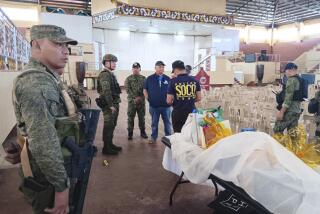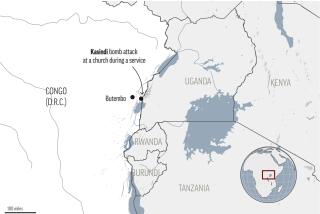Suicide bomber in Sri Lanka kills 13
ISLAMABAD, PAKISTAN — A suicide bomber in Sri Lanka attacked a Muslim religious procession Tuesday, killing at least 13 people and injuring more than three dozen, including a government minister, officials said.
The army blamed the Tamil Tigers separatist group, which for a quarter of a century has been fighting for a homeland in the northern part of the South Asian island nation.
Tiger militants, formally known as the Liberation Tigers of Tamil Eelam, or LTTE, are on their heels. Government forces have encircled them in recent months in a small pocket of territory in the north, along with tens of thousands of civilians.
The militants have been concentrated into an area of about 23 square miles, said Brig. Udaya Nanayakkara. “They’re desperate,” he said.
But the bombing showed that the ethnic Tamil group could still launch an attack far from its traditional base in an area populated largely by majority Sinhalese. By some accounts, the attacker was on a bicycle and mixed in with the crowd before exploding what the army said was a vest.
“The message they’re trying to send is, ‘Whatever you do, we’re still there,’ ” said Jean-Charles Brisard, a Paris-based expert on international terrorism.
The explosion occurred in the southern city of Matara during a celebration of Mawlid, marking the anniversary of the prophet Muhammad’s birth.
“With the LTTE, there’s no love lost for Muslims,” said R. Hariharan, a retired colonel who headed intelligence for the Indian peacekeeping forces in Sri Lanka in the late 1980s.
Some 100,000 Muslims, many of whom had lived there for generations, were given 48 hours to leave Sri Lanka’s northern Jaffna peninsula many years ago when the Tigers first occupied the area. They spoke Tamil, so some took jobs in army intelligence fighting against the separatists.
The Tigers, listed as a terrorist group by the United States and European Union, have pioneered many tactics, some of which have been adopted by militant groups around the world.
The group has developed sophisticated financing methods during its war, which has left an estimated 70,000 people dead. It owned a fleet of commercial vessels and even maintained a small air force, using two light aircraft last month to launch a modest attack on Colombo, the capital.
It also pioneered the use of suicide vests, which it used to assassinate Indian Prime Minister Rajiv Gandhi in 1991 as well as to kill several senior Sri Lankan officials. By some accounts, it has carried out more suicide bombings than Hamas, Islamic Jihad and Al Qaeda combined.
The Tigers refined their methods, experts said, by recruiting many female bombers and by adding a trigger mechanism that was activated when a bomber’s arms were raised -- such as might happen if a bomber came under police suspicion. This reportedly has resulted in the group’s suicide bombers being captured alive less frequently than its Palestinian counterparts, for example.
Nanayakkara said that the military had expected more attacks such as the one Tuesday and had recently added roadblocks, but that the festival provided the group with an opportunity. He said 13 civilians were killed by the bomber.
More than 200 militants and an unspecified number of soldiers have been killed in fighting in the north since Thursday, the army said. The pro-militant TamilNet website, quoting rebel radio, said at least 100 soldiers died Sunday.
Analysts said the government has put the Tamil community in Colombo under extremely tight oversight -- residents are registered, carefully monitored and any newcomers investigated -- which has led the Tigers to look for softer targets elsewhere in the country.
--
More to Read
Sign up for Essential California
The most important California stories and recommendations in your inbox every morning.
You may occasionally receive promotional content from the Los Angeles Times.










